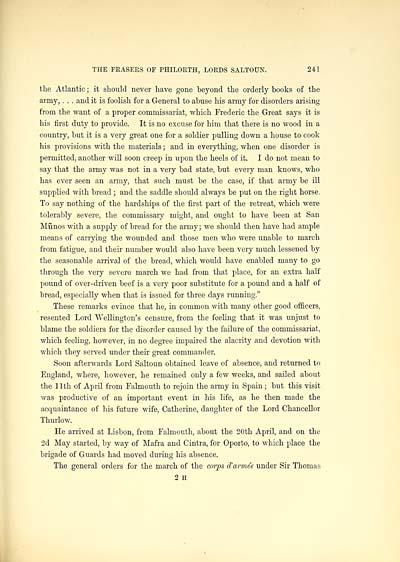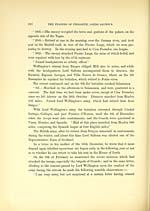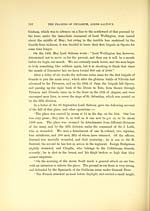Frasers of Philorth > Volume 1
(313)
Download files
Complete book:
Individual page:
Thumbnail gallery: Grid view | List view

THE FEASERS OF PHILORTH, LORDS SALTOUN. 241
the Atlantic ; it should never have gone beyond the orderly books of the
army, . . . and it is foolish for a General to abuse his army for disorders arising
from the want of a proper commissariat, which Frederic the Great says it is
his first duty to provide. It is no excuse for him that there is no wood in a
country, but it is a very great one for a soldier pulling down a house to cook
his provisions with the materials ; and in everything, when one disorder is
permitted, another will soon creep in upon the heels of it. I do not mean to
say that the army was not in a very bad state, but every man knows, who
has ever seen an army, that such must be the case, if that army be ill
supplied with bread ; and the saddle should always be put on the right horse.
To say nothing of the hardships of the first part of the retreat, which were
tolerably severe, the commissary might, and ought to have been at San
Munos with a supply of bread for the army; we should then have had ample
means of carrying the wounded and those men who were unable to march
from fatigue, and their number would also have been very much lessened by
the seasonable arrival of the bread, which would have enabled many to go
through the very severe march we had from that place, for an extra half
pound of over-driven beef is a very poor substitute for a pound and a half of
bread, especially when that is issued for three days running."
These remarks evince that he, in common with many other good officers,
resented Lord "Wellington's censure, from the feeling that it was unjust to
blame the soldiers for the disorder caused by the failure of the commissariat,
which feeling, however, in no degree impaired the alacrity and devotion with
which they served under their great commander.
Soon afterwards Lord Saltoun obtained leave of absence, and returned to
England, where, however, he remained only a few weeks, and sailed about
the 11th of April from Falmouth to rejoin the army in Spain ; but this visit
was productive of an important event in his life, as he then made the
acquaintance of his future wife, Catherine, daughter of the Lord Chancellor
Thurlow.
He arrived at Lisbon, from Falmouth, about the 20th April, and on the
2d May started, by way of Mafra and Cintra, for Oporto, to which place the
brigade of Guards had moved during his absence.
The general orders for the march of the corps d'armee under Sir Thomas
2 H
the Atlantic ; it should never have gone beyond the orderly books of the
army, . . . and it is foolish for a General to abuse his army for disorders arising
from the want of a proper commissariat, which Frederic the Great says it is
his first duty to provide. It is no excuse for him that there is no wood in a
country, but it is a very great one for a soldier pulling down a house to cook
his provisions with the materials ; and in everything, when one disorder is
permitted, another will soon creep in upon the heels of it. I do not mean to
say that the army was not in a very bad state, but every man knows, who
has ever seen an army, that such must be the case, if that army be ill
supplied with bread ; and the saddle should always be put on the right horse.
To say nothing of the hardships of the first part of the retreat, which were
tolerably severe, the commissary might, and ought to have been at San
Munos with a supply of bread for the army; we should then have had ample
means of carrying the wounded and those men who were unable to march
from fatigue, and their number would also have been very much lessened by
the seasonable arrival of the bread, which would have enabled many to go
through the very severe march we had from that place, for an extra half
pound of over-driven beef is a very poor substitute for a pound and a half of
bread, especially when that is issued for three days running."
These remarks evince that he, in common with many other good officers,
resented Lord "Wellington's censure, from the feeling that it was unjust to
blame the soldiers for the disorder caused by the failure of the commissariat,
which feeling, however, in no degree impaired the alacrity and devotion with
which they served under their great commander.
Soon afterwards Lord Saltoun obtained leave of absence, and returned to
England, where, however, he remained only a few weeks, and sailed about
the 11th of April from Falmouth to rejoin the army in Spain ; but this visit
was productive of an important event in his life, as he then made the
acquaintance of his future wife, Catherine, daughter of the Lord Chancellor
Thurlow.
He arrived at Lisbon, from Falmouth, about the 20th April, and on the
2d May started, by way of Mafra and Cintra, for Oporto, to which place the
brigade of Guards had moved during his absence.
The general orders for the march of the corps d'armee under Sir Thomas
2 H
Set display mode to:
![]() Universal Viewer |
Universal Viewer | ![]() Mirador |
Large image | Transcription
Mirador |
Large image | Transcription
Images and transcriptions on this page, including medium image downloads, may be used under the Creative Commons Attribution 4.0 International Licence unless otherwise stated. ![]()
| Histories of Scottish families > Frasers of Philorth > Volume 1 > (313) |
|---|
| Permanent URL | https://digital.nls.uk/96569256 |
|---|
| Attribution and copyright: |
|
|---|
| Description | A selection of almost 400 printed items relating to the history of Scottish families, mostly dating from the 19th and early 20th centuries. Includes memoirs, genealogies and clan histories, with a few produced by emigrant families. The earliest family history goes back to AD 916. |
|---|

